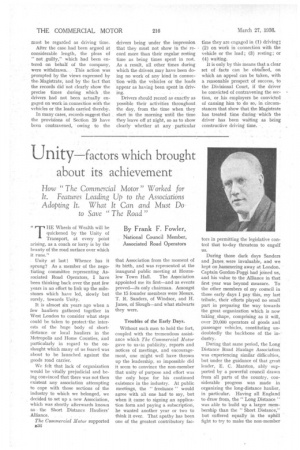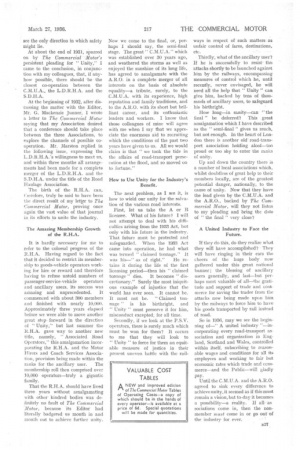Unity factors which brought
Page 50

Page 51

If you've noticed an error in this article please click here to report it so we can fix it.
about its achievement
By Frank F. Fowler, National Council Member, Associated Road Operators THE Wheels of Wealth will be quickened by the Unity of Transport, at every point arising, as a coach or lorry is by the beauty of the road surface over which it runs."
Unity at last ] Whence has it sprung? As a member of the negotiating committee representing Associated Road Operators, I have been thinking back over the past few years in an effort to link up the milestones which have led, slowly but surely, towards Unity.
It is almost six years ago when a few hauliers gathered together in West London to consider what steps could be taken to protect•the interests of the huge body of shortdistance or local hauliers in the Metropolis and Home Counties, and particularly in regard to the onslaught which many of us feared was about to be launched against the goods road carrier.
We felt that lack of organization would be vitally prejudicial and being convinced that there was not then existent any association attempting to cope with those sections of the industry to which we belonged, we decided to set up a new Association, which was shortly afterwards known as the Short Distance Hauliers'
Alliance.
The Commercial Motor supported E3(; that Association from the moment of its birth, and was represented at the inaugural public meeting at Houns low Town Hall. The Association appointed me its first—and as events proved—its only chairman. Amongst the 15 founder members were Messrs. T. R. Sanders, of Windsor, and H. Janes, of Slough—and what stalwarts they were.
Troubles of the Early Days.
Without such men to hold the fort, coupled with the tremendous assistance which The Commercial Motor gave to us Pin publicity, reports and notices of meetings, and encouragement, one might well have thrown up the leadership, so impossible did it seem to convince the non-member that unity of purpose and effort was the only hope for his continued existence in the industry. At public meetings, the " freelance " would agree with all one had to say, but when it came to signing an application form and paying a subscription, he wanted another year or two to think it over. That apathy has been one of the greatest contributory fac tors in permitting the legislative control that to-day threatens to engulf us.
During those dark days Sanders and Janes, were invaluable, and we kept on ;hammering away at London. Captain Gordon-Poggi had joined us, and his value to the Alliance in that first year was beyond measure. To the other members of my council in those early days I pay this, my last tribute, their efforts played no small part in preparing the way towards the great organization which is now taking, shape, comprising as it will, over 20,000 operators of goods and passenger vehicles, constituting undoubtedly the backbone of the industry.
During that same period, the Long Distance Road Haulage Association was experiencing similar difficulties, but under the guidance of that great leader, E. C. Marston, ably supported by a powerful council drawn from all parts of the country, considerable progress was made in organizing the long-distance haulier, in particular. Having all England to draw from, the "Long Distance-" was able to build up a larger membership than the "Short Distance," but suffered equally in the uphill fight to try to make the non-member see the only direction in which safety might lie.
At about the end of 1031, spurred an by The Commercial Molar's persistent pleading for " Unity," I came to the conclusion, in conjunction with my colleagues, that, if anyhow possible, there should be the closest co-operation between the C.M.U.A., the L.D.R.H.A. and the S.D.H.A.
At the beginning of 1932, after discussing the matter with the Editor, Mr. G. Mackenzie Junner, I wrote a letter to The Commercial Motor saying that my Association desired that a conference should take place between the three Associations, to explore the channels of possible cooperation, Mr. Marston replied in the following issue, expressing the L.D.R.H.A.'s willingness to meet us, and within three months all arrangements had been made for a complete merger of the L.D.R.H.A. and the S.D.H.A. under the title of the Road Haulage Association.
The birth of the R.H.A. can,
ierefore, truly he said to have been the direct result of my letter to The Commercial Motor, proving once again the vast value of that journal M its efforts to unite the industry.
The Amazing Membership Growth of the R.H.A.
It is hardly necessary for me to refer to the colossal progress of the R.H.A. Having regard to the fact that it decided to restrict its membership to goods-vehicle operators working for hire or reward and therefore having to refuse untold numbers of passenger-service-vehicle operators and ancillary users, its success was amazing and unprecedented. It commenced with about 300 members and finished with nearly 10,000. Approximately three years elapsed before we were able to move another great step forward in the direction of " Unity," but last summer the R.H.A. gave way to another new title, namely, " Associated Road Operators," this amalgamation incorporating the R.H.A. and the Motor Hirers and Coach Services Association, provision being made within the ranks for the ancillary user. The membership roll then comprised over 10,000 operators—truly a gigantic family.
That the R.H.A. should have lived three years without arriaigamating with other kindredbodies was definitely no fault of The CoMmercial )10for, because its Editor had literally badgered us month: in and month out to achieve further unity. Now we come to the final, or, perhaps I should say, the semi-final stage. The great" C.M.I.T.A." which was established over 30 years ago, and weathered the storms as well as enjoyed the sunshine of its long life, has agreed to amalgamate with the A.R.O. in a complete merger of all interests on the basis of absolute equality—a tribute, surely, to the .C.M.U.A. with its experience, high reputation and family traditions, and to the A.R.O. with its short but brilliant career, and its enthusiastic leaders and workers. I know that those -colleagues of mine will agree with me when I say that we appreciate the enormous aid to recruiting which the conditions of the past two years have given to us. All we would claim is that " we took the tide in the affairs of road-transport persecution at the flood, and so moved on to fortune.— How to Use Unity for the Industry's Benefit.
The next problem, as I ace it, is how to wield our unity for the salvation of the various road interests.
First, let us take the A or B licensee. What of his future? I will not attempt to deal with his difficulties arising front the 19:33 Act, but only with his future in the industry. That future must be protected anti safeguarded. When the 1933 Act came into operation, he had what was termed " claimed tonnage." It
was his—" as of right." He retains it during the life of the first licensing period—then his " claimed tonnage" dies. It becomes "discretionary." Surely the most iniquitous example of injustice that the world has ever seen. It cannot be. It must not be, "Claimed tonnage " is his birthright, and " Unity " must preserve it for him, misconduct excepted, for all time.
Secondly, if we look at the P.S.V. operators, there is surely much which must be won for them? It occurs to me that they will look to " Unity " to force for them an equitable measure of justice in their present uneven battle with the rail
ways in respect of such matters. as unfair control of fares, destinations, etc.
Thirdly, what of the ancillary user? If he is successfully to resist' tilt, attacks shortly to be launched-against him by the railways, encompassing measures of control which he-, until recently, never envisaged, he will need all the help that " Unity " can give him, backed by tens of thousands of ancillary users, to safeguard his birthright.
How long—in sanity—can "the final " be deferred? This great amalgamation which I have described as the "semi-final " gives us much. but not enough. In the heart of London there is another oldroad-transport association holding aloof—too proud or too shy to enter the ranks of unity.
Up and down the country there is a number of local associations which, whilst doubtless of great help to their members locally, are of the greatest potential danger, nationally, to the cause of unity. Now that they have the lead given by the C.M.U,A. and the A.R.O., backed by The Commercial Motor, will they not listen to my pleading and bring the date of "the final" very close?
A United Industry to Face the Future.
If they do this, do they realize what they will have accomplished? They will have ringing in their ears the cheers of the huge body now gathered under this great national banner; the blessing of ancillary users generally, and last—but perhaps most valuable of all-the gratitude and support of trade and commerce for saving the trader from the attacks now being made upon him by the railways to force him to have his goods transported by rail instead of road.
So in 1936, may we see the beginning of—" A united industry "—incorporating every road-transport association and organization in England, Scotland and Wales, controlled within itself, subscribing to reasonable wages and conditions for all its employees and working to fair but economic rates which trade and cornmerde—and the Public—will gladly pay.
Until the C.M.U.A. and the A.R.O. agreed to sink every difference. to achieve unity, it seemed as if this must remain a vision, but to-day it becomes a possibility—a reality. If all-as aociations come in, then the nonmember must come in or go out of the industry for ever.




























































































